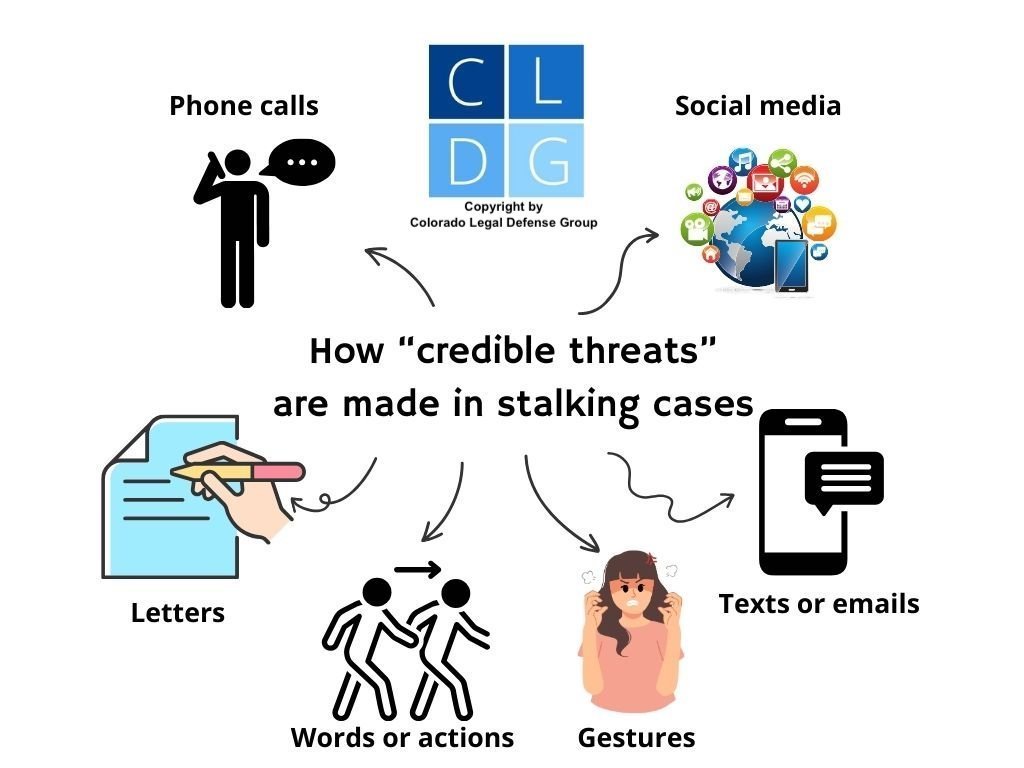If you are arrested for stalking in Colorado, Vonnie’s Law requires you to appear before a judge before bailing out. This may take several days, which ensures that you remain in custody and away from the alleged victim.
Vonnie’s Law is named after Vonnie Flores, who in 2010 was killed by her stalker.
Earlier, Vonnie had reported him, and he was eventually arrested for violating a court order of protection. However, Vonnie’s stalker was able to bail out of jail after only three hours. Shortly afterward, he shot Vonnie and committed suicide.
Vonnie’s sister lobbied to strengthen the state’s stalking laws. Perhaps Vonnie would never have died had different procedures been in place that afforded added protections to stalking victims.
Eventually, Vonnie’s sister and other victim advocates succeeded in getting Vonnie’s Law passed through the state general assembly and changing Colorado criminal law.1

What is Stalking?
Three types of behavior qualify as “stalking” under Colorado Revised Statute 18-3-602.
The first type of stalking is making a credible threat to the victim and repeatedly following, contacting, or surveilling that person, their immediate family, or someone that person has or has had a continuing relationship with.
The second type of stalking is making a credible threat to the victim and repeatedly communicating with that person, their immediate family, or someone that person has or has had a continuing relationship with, regardless of whether a conversation ensues.
The third type of stalking has three elements that prosecutors would have to prove:
- You were repeatedly following, approaching, contacting, surveilling, or communicating with the victim, their immediate family, or someone that person has or has had a continuing relationship with; and
- Your manner would cause a reasonable person to suffer serious emotional distress; and
- You actually caused serious emotional distress to that person, their immediate family, or someone that person has or has had a continuing relationship with.2
Note that the victim need not show they received professional treatment or counseling to show that they suffered serious emotional distress.

Stalking can occur in person or over the internet.
“Immediate family members” include the stalking victim’s:
- parents,
- grandparents,
- siblings,
- children, as well as
- the person’s spouse.
A “credible threat” does not need to be directly expressed or a physical action as long as the totality of the conduct would cause a reasonable person to be in such fear of the person’s safety. The stalking can take any form of communication, including:
- speaking in person to the alleged victim,
- phone calls, or
- social media messages.3

People arrested for stalking in Colorado must go before a judge prior to posting bail.
Bail
Before Vonnie’s law, you could bail out as soon as you were booked following a stalking arrest. Now, you first have to go before a judge and sign the mandatory protective order in the judge’s presence: This can extend your time in custody by days.4
Penalties
Unlike the lesser Colorado crime of harassment, stalking is an extraordinary risk crime and is never a misdemeanor.
A first-time offense of stalking is a class 5 felony, carrying:
- 1 to 4 years in prison (with mandatory 2 years of parole) and/or
- A fine of $1,000 to$100,000.
A second or subsequent offense (within seven years) is a class 4 felony in Colorado. The punishment is:
- 2 to 8 years in prison (with mandatory 3 years of parole) and/or
- A fine of $2,000 to $500,000.
Meanwhile, stalking in violation of an outstanding protection order – or a condition of parole or probation – is a class 4 felony. The penalties are:
- 2 to 8 years in prison (with mandatory 3 years of parole) and/or
- A fine of $2,000 to $500,000.
Note that any sentence for violation of a court order is served consecutively with the stalking sentence, not concurrently.5

There are many ways to fight stalking charges in Colorado.
Defenses
Here at Colorado Legal Defense Group, I have represented countless people charged with stalking. In my experience, the following five defenses have proven very effective with prosecutors, judges, and juries at getting CRS 18-3-602 cases reduced or dismissed.
- You did not threaten anyone;
- The victim suffered no emotional distress;
- You contacted the victim only once;
- A reasonable person would not have taken your actions seriously; or
- Law enforcement committed misconduct, such as executing an unlawful search.
Common evidence I rely on to show the court there is reasonable doubt includes:
- eyewitness testimony,
- video footage, and
- recorded communications, such as texts.6

Stalking is always a felony in Colorado.
Additional Resources
If you are a victim in need of help, call the National Domestic Violence Hotline at 800-799-7233. Also find help at:
- Domestic Violence Program – Colorado Department of Human Services.
- SafeHouse Denver – an emergency shelter.
- Family Tree Domestic Violence Services – crisis line and shelter.
- Project Safeguard – advocacy and advice.
- Violence Free Colorado – advocacy services and support groups.
- TESSA of Colorado Springs – crisis line and shelter.
Legal References
- Caddie Nath, Hamner’s anti-stalking bill sails through committee, Summit Daily (February 18, 2012).
- CRS 18-3-602.
- CRS 18-3-602; see also People v. Wagner (Colo.App. 2018) 434 P.3d 731.
- CRS 18-3-602.
- CRS 18-3-602.
- See People v. Folsom (Colo.App. 2017) 431 P.3d 652.

